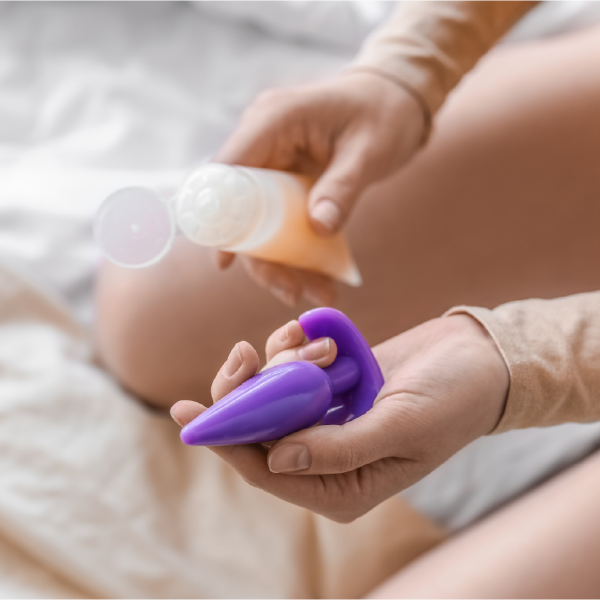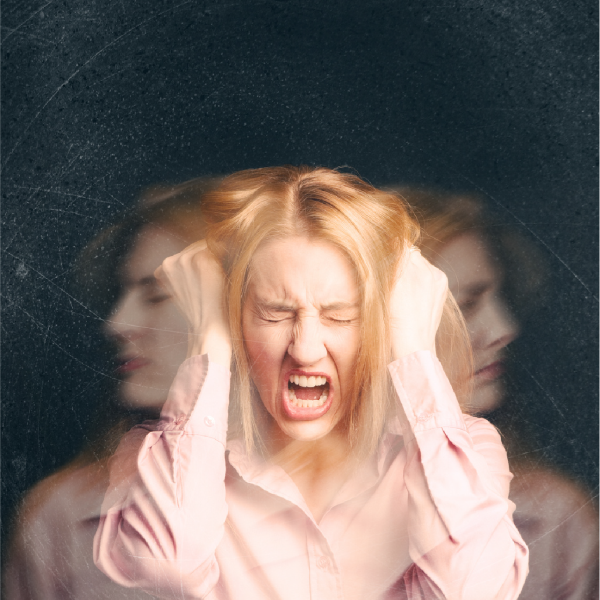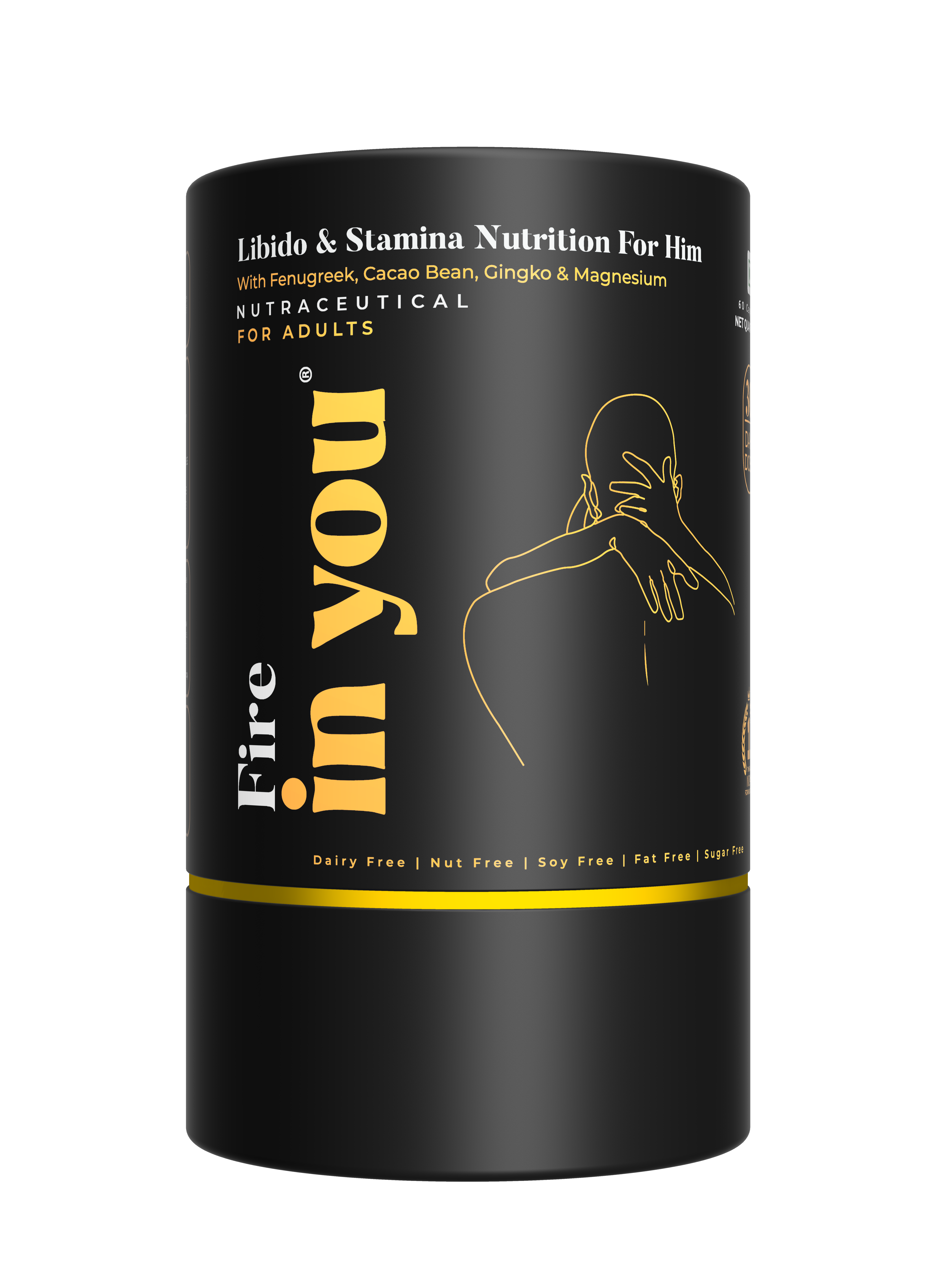- products
- Science
- wellness journal
- About Us
- Faqs
- Sustainability
- Contact Us
- Self Test
- English

Have you ever wondered why a simple touch or even a sniff of a certain perfume can send shivers down your spine? This is the fascinating world of sexual desire!
Sexual desire is an intricate and essential part of human relationships and overall well-being. It plays a role in reproduction and goes way beyond that, helping us build connection, intimacy and pleasure while also building bonds with our partners. Understanding the physiology behind this powerful force can help us appreciate its role in our lives and manage it more effectively.
A complex interplay between hormones, brain and nervous system responses drives sexual desire. Hormones such as testosterone, estrogen, and progesterone play a pivotal role in regulating libido. The brain, particularly the hypothalamus and limbic system, directs the release of neurotransmitters such as dopamine and serotonin. These neurotransmitters can significantly influence sexual motivation and pleasure. Moreover, sexual desire is influenced by other factors such as mood, stress, and emotional connection. These psychological triggers can enhance or diminish desire, depending on various factors such as relationship dynamics and individual mental health.
In this blog, we will explore the different aspects of sexual desire and the mechanisms that drive it. We’ll also discuss external factors that impact desire, such as medications and lifestyle choices, and provide practical tips for enhancing libido.
What is sexual desire?
Sexual desire has often been thought of as an emotion. Something that arises from an individual’s mental state. Perhaps similar to surprise, grief, joy or sadness. However, recent research states that this might not be the case. Psychologists believe that sexual desire may be more similar to other bodily urges, such as hunger or the need to drink water. Clinical psychologists state that desires can be hard-wired emotional and physiological responses (1). Sexual desire may be one of the most vital human needs and plays a pivotal role in our lives.
Mainstream media tends to quantify this desire through magazines, steamy movies, videos, etc. Reading glossy magazines telling you “how much sex a couple should have” or ideas about what your desire and sex life should look like. However, sexual desire is not the same for everyone, and one model doesn’t fit all.
Sexual desire or libido is our experience of craving something physical or intimate with someone. It can be regarding your want to engage in sexual activities and receive sexual pleasure. The desire for physical intimacy can be affected by several factors. Someone with a low sexual desire may often feel isolated and find it difficult to talk about. However, this is normal, and there are different ways to improve your sexual desire.
What regulates sexual desire?
Sexual desire is driven by a mix of hormones and neurotransmitters firing in the brain. The primary sex hormones, testosterone and estrogen, are essential in the process of desire. Testosterone is the primary male sex hormone, while estrogen regulates female reproductive development.
The decline of sexual desire with age can be attributed to the decrease in levels of testosterone in males. This also leads to the development of erectile dysfunction or libido problems. Females are led by estrogen; however, they also produce a certain amount of testosterone. Studies believe that for females, a combination of both primary sex hormones is the ultimate love hormone.
These sex hormones are, in turn, responsible for the production of neurochemicals in the brain, such as serotonin, dopamine and oxytocin. Combining these neurochemicals can trigger a euphoric, passionate and exciting feeling.
Dopamine: Dopamine acts on the parts of the brain that produce feelings of satisfaction, pleasure, and motivation. It trains a person to associate a particular thing with the feeling of being satiated and pleasured. It is also termed the ‘feel good’ hormone, as a flood of dopamine can give you a euphoric rush. In the case of sexual desire, whenever you encounter someone you are attracted to, the release of dopamine gets triggered in your brain (2).
Serotonin: Like dopamine, serotonin trains our body to a cycle of desire and the resultant satisfaction. It can inhibit or increase your libido depending on which receptors are activated in the brain. Some specific serotonin receptors might also be responsible for specific moods and can dictate your response towards situations (3).
Oxytocin: Oxytocin, or the ‘love hormone’, plays an essential role in a mother and child’s bonding. It also plays an essential role in our social and sexual behaviour. During the 1980s, oxytocin was one of the first hormones discovered in the role of erectile function and sexual behaviour. Most of the research indicates the presence of high levels of oxytocin during an orgasm or ejaculation. It has also been linked to a positive impact on social behaviours such as trust and relaxation while decreasing stress and anxiety levels. Essentially, releasing this neurochemical relaxes you around a person and helps deepen a relationship (4).
These chemicals, along with others, play a role in regulating desire. However, isolating one mechanism remains an elusive task that confounds the best of minds.
Enhancing sexual desire
1. Exercise
Incorporating movement into your life is always a good idea. You don’t need to hit the gym every day to improve your libido, but including a 20-minute walk or aerobic session will uplift your mood and get your neurotransmitters firing away. Additionally, working out improves self-confidence and body image and lifts your mood while boosting your libido.
2. Stress levels
Find ways to manage your stress levels, such as mindfulness, meditation or yoga. Stress can cause a huge hindrance in your sex life and directly affect your libido. A great way to manage stress can be journalling and practising mindfulness.
3. Intimate conversation
Stressing about having a low sex drive can directly create stressful scenarios within your head, which can lead to sexual performance anxiety. Talking to your partner about your insecurities and being open about your current mood and sexual desire can go a long way in diffusing that stress. Having meaningful and intimate conversations with your partner also helps in building a more meaningful bond that can improve sexual desire.
4. Spice it up
Exploring new sexual avenues with your partner can be a fun sexual avenue. Trying new sex positions, role-playing and dipping into each other’s fantasies can re-ignite old flames and pique sexual interest.
5. Alternative supplements
Supplements such as Fenugreek, L-arginine, ashwagandha, and Ginkgo can improve sexual desire. Vitamins B3 and D help with energy levels and improve mental function.
Conclusion
Sexual desire is a complex and yet vital functionality of our body. Understanding the interplay of hormones, brain activity and social aspects affecting sexual desire is critical to appreciating its impact on our lives. Sexual desire isn’t just a biological necessity but a keystone towards building social connections and intimate bonds with loved ones. Lifestyle modifications, mindfulness, stress management, etc, can help in nurturing sexual desire and create more fulfilling intimate experiences.
Author:

Dr Tanya Prasad
Orthodontist
|BDS, MCODS (Manipal) MDS - SDS, KVV (Karad)
Reviewed By:
Dr. Indraneel
Medical Writer
Source:
1. Calabrò RS, Cacciola A, Bruschetta D, Milardi D, Quattrini F, Sciarrone F, la Rosa G, Bramanti P, Anastasi G. Neuroanatomy and function of human sexual behavior: A neglected or unknown issue? Brain Behav. 2019 Dec;9(12):e01389. doi: 10.1002/brb3.1389. Epub 2019 Sep 30.
2. Australia H. Dopamine [Internet]. www.healthdirect.gov.au. 2023. Available from:https://www.healthdirect.gov.au/dopamine#:~:text=Resources%20and%20
3. Berger M, Gray JA, Roth BL. The expanded biology of serotonin. Annu Rev Med. 2009;60:355-66. doi: 10.1146/annurev.med.60.042307.110802.
4. Cera N, Vargas-Cáceres S, Oliveira C, Monteiro J, Branco D, Pignatelli D, Rebelo S. How Relevant is the Systemic Oxytocin Concentration for Human Sexual Behavior? A Systematic Review. Sex Med. 2021 Aug;9(4):100370. doi: 10.1016/j.esxm.2021.100370. Epub 2021 Jun 9.

Dr Tanya Prasad
Orthodontist
|BDS, MCODS (Manipal) MDS - SDS, KVV (Karad)
Dr Tanya Prasad is an Orthodontist and a medical health writer with a work experience of 4+ years. She has several Patents, Copyrights and scientific publications credited to her name. Along with being a literature enthusiast she enjoys reading fiction in her free time.


Embrace your body, ignite intimacy, and unlock boundless pleasure.
Related Products
Get 10% off
on your first order
You’ll also get dibs and a heads up on any sales or product launches.










